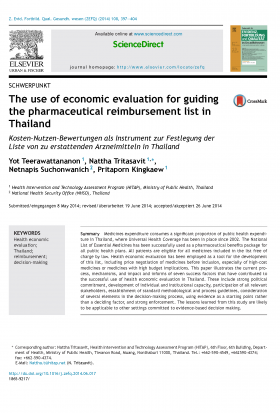This website uses cookies so that we can provide you with the best user experience possible. Cookie information is stored in your browser and performs functions such as recognising you when you return to our website and helping our team to understand which sections of the website you find most interesting and useful.
The use of economicevaluation for guiding the pharmaceutical reimbursement list in Thailand. (2014)

รายละเอียดเพิ่มเติม
Summary
Medicines expenditure consumes a significant proportion of public health expenditure in Thailand, where Universal Health Coverage has been in place since 2002. The National List of Essential Medicines has been successfully used as a pharmaceutical benefits package for all public health plans. All patients are eligible for all medicines included in the list free of charge by law. Health economic evaluation has been employed as a tool for the development of this list, including price negotiation of medicines before inclusion, especially of high-cost medicines or medicines with high budget implications. This paper illustrates the current process, mechanisms, and impact and informs of seven success factors that have contributed to the successful use of health economic evaluation in Thailand. These include strong political commitment, development of individual and institutional capacity, participation of all relevant stakeholders, establishment of standard methodological and process guidelines, consideration of several elements in the decision-making process, using evidence as a starting point rather than a deciding factor, and strong enforcement. The lessons learned from this study are likely to be applicable to other settings committed to evidence-based decision making.
Link: http://www.sciencedirect.com/science/article/pii/S1865921714001548




